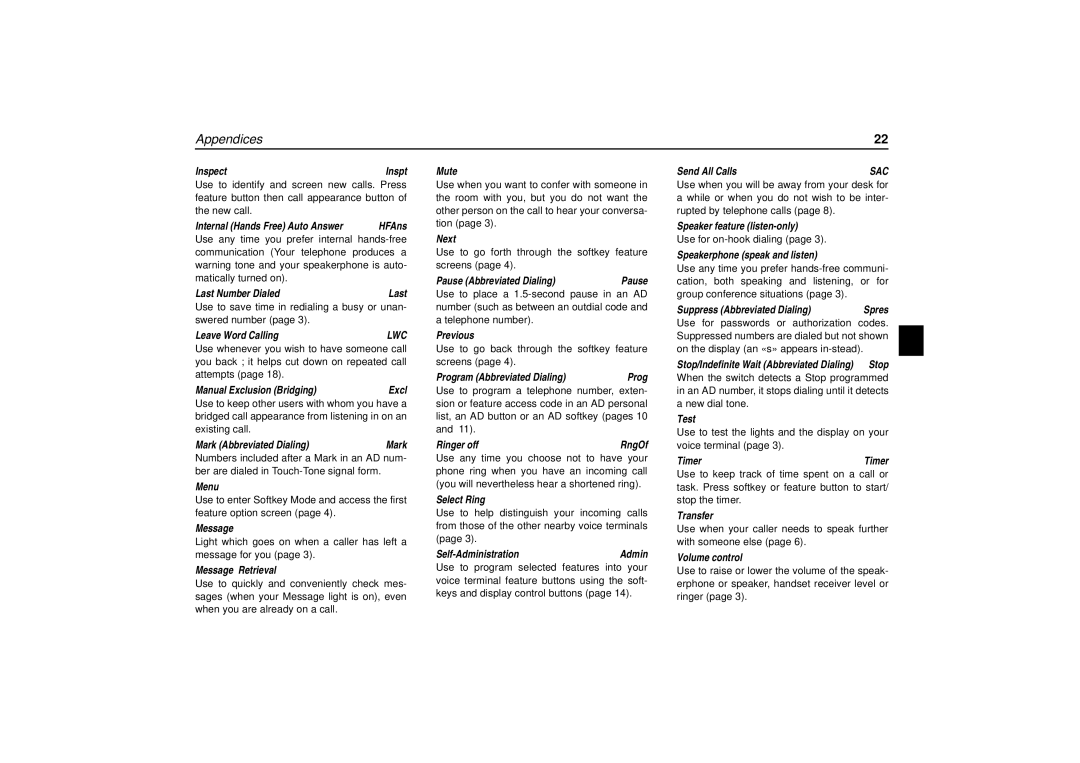Appendices | 22 |
InspectInspt
Use to identify and screen new calls. Press feature button then call appearance button of the new call.
Internal (Hands Free) Auto Answer | HFAns |
Use any time you prefer internal
Last Number Dialed | Last |
Use to save time in redialing a busy or unan- swered number (page 3).
Leave Word Calling | LWC |
Use whenever you wish to have someone call you back ; it helps cut down on repeated call attempts (page 18).
Manual Exclusion (Bridging) | Excl |
Use to keep other users with whom you have a bridged call appearance from listening in on an existing call.
Mark (Abbreviated Dialing) | Mark |
Numbers included after a Mark in an AD num- ber are dialed in
Menu
Use to enter Softkey Mode and access the first feature option screen (page 4).
Message
Light which goes on when a caller has left a message for you (page 3).
Message Retrieval
Use to quickly and conveniently check mes- sages (when your Message light is on), even when you are already on a call.
Mute
Use when you want to confer with someone in the room with you, but you do not want the other person on the call to hear your conversa- tion (page 3).
Next
Use to go forth through the softkey feature screens (page 4).
Pause (Abbreviated Dialing) | Pause |
Use to place a
Previous
Use to go back through the softkey feature screens (page 4).
Program (Abbreviated Dialing) | Prog |
Use to program a telephone number, exten- sion or feature access code in an AD personal list, an AD button or an AD softkey (pages 10 and 11).
Ringer off | RngOf |
Use any time you choose not to have your phone ring when you have an incoming call (you will nevertheless hear a shortened ring).
Select Ring
Use to help distinguish your incoming calls from those of the other nearby voice terminals (page 3).
Self-Administration Admin
Use to program selected features into your voice terminal feature buttons using the soft- keys and display control buttons (page 14).
Send All Calls | SAC |
Use when you will be away from your desk for a while or when you do not wish to be inter- rupted by telephone calls (page 8).
Speaker feature (listen-only)
Use for
Speakerphone (speak and listen)
Use any time you prefer
Suppress (Abbreviated Dialing) | Spres |
Use for passwords or authorization codes. Suppressed numbers are dialed but not shown on the display (an «s» appears
Stop/Indefinite Wait (Abbreviated Dialing) | Stop |
When the switch detects a Stop programmed in an AD number, it stops dialing until it detects a new dial tone.
Test
Use to test the lights and the display on your voice terminal (page 3).
Timer | Timer |
Use to keep track of time spent on a call or task. Press softkey or feature button to start/ stop the timer.
Transfer
Use when your caller needs to speak further with someone else (page 6).
Volume control
Use to raise or lower the volume of the speak- erphone or speaker, handset receiver level or ringer (page 3).
